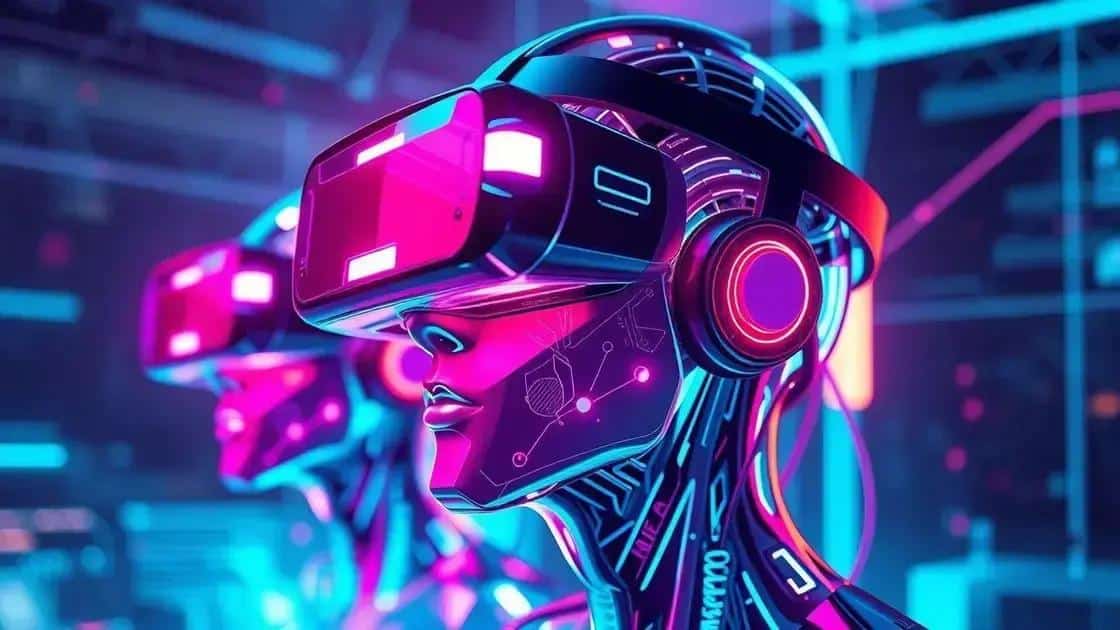AI-generated media trends shaping the future of content

AI-generated media transforms content creation by utilizing artificial intelligence to create personalized, efficient, and innovative outputs, enhancing creativity while raising ethical considerations around privacy and bias.
AI-generated media trends are rapidly changing the landscape of content creation. Have you ever wondered how these advancements affect what you see online? Let’s delve into this fascinating subject.
Understanding AI-generated media
In today’s digital age, understanding AI-generated media is crucial for anyone interested in technology and content creation. This innovative approach to media uses artificial intelligence to produce a variety of outputs, reshaping how we interact with content.
What is AI-generated media?
AI-generated media refers to content that is created using algorithms and machine learning techniques. These technologies can mimic human creativity, generating everything from text and images to music and videos. As a result, AI-generated media is becoming increasingly popular across various platforms.
Benefits of AI-generated media
- Increased efficiency in content creation
- Cost-effectiveness for businesses
- Ability to personalize experiences for users
- Endless creative possibilities
As we explore the benefits, it’s clear that AI can streamline processes and enhance creativity. For instance, companies utilize AI to analyze user preferences, tailoring content that engages audiences more effectively. Instead of spending hours brainstorming or editing, creators can focus on important aspects of their projects.
Moreover, AI-generated content allows for rapid experimentation and iteration. This flexibility enables brands to test different strategies and find what resonates best with their audience. The possibilities are endless, making AI-generated media an exciting frontier in the digital landscape.
Real-world applications
Different industries are already embracing AI-generated media. In marketing, businesses use AI to create engaging advertisements that capture consumer interest. In journalism, AI can assist in drafting articles by pulling information from diverse sources. This integration is transforming traditional practices and paving the way for new forms of storytelling.
As technology continues to evolve, it’s essential to stay informed about these trends. Understanding and adapting to AI-generated media can help individuals and organizations stay competitive in an ever-changing digital environment.
Impact of AI on content creation

The impact of AI on content creation is profound. As technology advances, AI has become a major player in how we create and distribute media. This shift is not just about efficiency; it’s about redefining creativity.
Transforming traditional roles
AI tools are changing the landscape for writers, artists, and musicians. Many creators use AI to generate ideas or even first drafts of their work. This collaboration between human and machine enhances productivity. Moreover, AI helps in research, enabling creators to gather information quickly.
Enhancing creativity
- Generates unique content ideas
- Provides insights into trending topics
- Suggests improvements in style and tone
- Automates repetitive tasks
As AI enhances creativity, it opens new avenues. For example, artists can experiment with AI to produce unique pieces that might not be possible by hand. This fusion of technology and art creates fresh perspectives in content creation.
Additionally, AI analyzes user engagement. By understanding what works, creators can tailor content to meet audience preferences. This focus on audience engagement leads to more effective content strategies. Creators now rely on data-driven insights to guide their work, ensuring relevance.
Challenges and considerations
Despite the positives, the impact of AI on content creation also raises questions. What happens to originality when machines generate content? There are concerns about copyright and ownership. It is essential for creators to navigate these challenges as they integrate AI into their workflows.
Training AI models requires vast amounts of data, often collected from existing content. This reliance raises ethical questions. How do we ensure the integrity and fairness of AI-generated outputs? As we embrace these technologies, it is vital to maintain a balance between innovation and responsibility.
Ethical considerations in AI media
The ethical considerations in AI media are gaining more attention as technology evolves. As we incorporate AI into content creation, it is essential to think about the moral implications. This technology has the potential to change how media is produced and consumed, but it also raises important questions regarding responsibility and integrity.
Data privacy concerns
One of the main ethical concerns is data privacy. AI relies on vast amounts of data to learn and create. This data often comes from users without their awareness, posing risks to personal privacy. Ensuring user consent is crucial when collecting data.
Bias and representation
- Potential biases in AI algorithms
- Impact on underrepresented groups
- Creating stereotypes in AI-generated content
- Need for diverse datasets
Another significant issue is bias. AI systems may unintentionally perpetuate existing biases present in the data they are trained on. This can lead to stereotypes in AI-generated media, which can harm underrepresented groups. Addressing bias requires diverse datasets to train AI systems, ensuring fair representation.
Additionally, the authenticity and originality of AI-generated media raise ethical questions. If an AI program creates art, who owns that work? This dilemma prompts discussions about creativity and intellectual property. Artists and industries must navigate these complex waters to protect their creations while embracing technology.
Accountability and transparency
Accountability is another critical aspect of the ethical discussion. When an AI system produces fictional or misleading content, who is responsible? There must be mechanisms in place to hold developers and companies accountable for their AI’s outputs. Transparency in AI processes can help build trust with consumers.
As we advance in the use of AI-generated media, these ethical considerations become increasingly relevant. By engaging in open discussions about these issues, we can harness the benefits of AI while minimizing potential harm.
Future trends in AI-generated media

The future trends in AI-generated media promise to reshape the content landscape in exciting ways. As technology evolves, new possibilities emerge for how content is created, distributed, and consumed. Understanding these trends can help creators and marketers stay ahead in the ever-changing digital world.
Increased personalization
One major trend is the push for increased personalization. AI can analyze user data to tailor content to individual preferences. This customization can improve user engagement, making content more relevant and appealing. For example, AI can recommend articles or videos based on a user’s viewing history.
Enhanced creative collaboration
- AI-driven tools assisting artists and writers
- Creation of hybrid works blending human and AI creativity
- Support for brainstorming and idea generation
Another exciting trend is enhanced creative collaboration between humans and AI. Tools powered by AI can assist artists and writers in generating ideas, leading to unique projects. This partnership opens new avenues for creativity, allowing for hybrid works that combine human insight and AI capabilities.
As we look towards the future of AI-generated media, further advancements in automation are anticipated. Simple tasks, like video editing or content formatting, can be automated, freeing creators to focus on more significant aspects of their work. This shift will likely lead to higher productivity and quality across various media formats.
Integration of VR and AR
Virtual and augmented reality will likely see increased integration with AI-generated media. Imagine immersive experiences that adapt to your preferences in real-time, creating a dynamic interaction with content. These technologies can provide new ways for audiences to engage with media, enhancing storytelling and viewer experience.
As we embrace these changes, staying adaptable is vital. The future trends in AI-generated media will bring both challenges and opportunities. Creators and businesses must remain informed about developments and adapt their strategies accordingly to leverage the full potential of AI.
In conclusion, the landscape of AI-generated media is rapidly evolving and presents both exciting opportunities and challenges. As technology continues to advance, we can expect greater personalization, enhanced creative collaboration, and integration of emerging technologies like VR and AR. However, it’s crucial to remain aware of the ethical considerations that come with these developments, ensuring that we use AI responsibly. By staying informed and adaptable, creators can harness the power of AI to shape the future of content in innovative ways.
FAQ – Frequently Asked Questions about AI-generated Media
What is AI-generated media?
AI-generated media refers to content created using artificial intelligence, including text, images, videos, and music.
How does AI enhance content creation?
AI enhances content creation by offering personalized recommendations, assisting with brainstorming, and automating repetitive tasks.
What are some ethical concerns regarding AI in media?
Key ethical concerns include data privacy, potential biases in AI algorithms, and ownership issues of AI-generated content.
How will AI impact the future of media and content?
AI is expected to increase personalization, enhance collaboration between humans and machines, and integrate with technologies like VR and AR.





